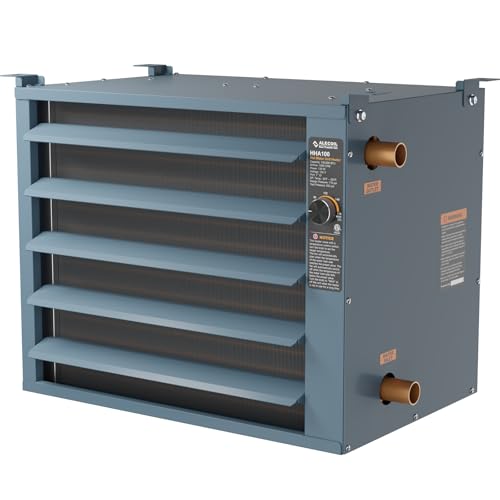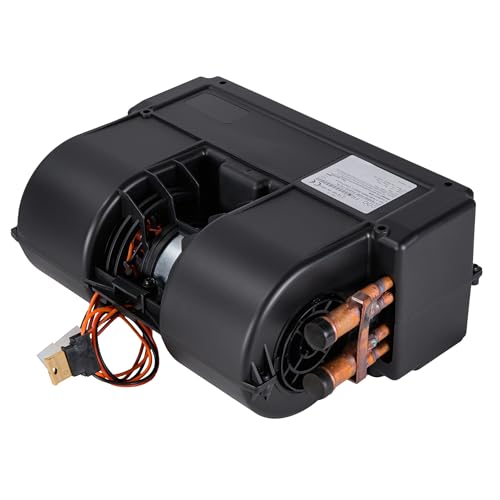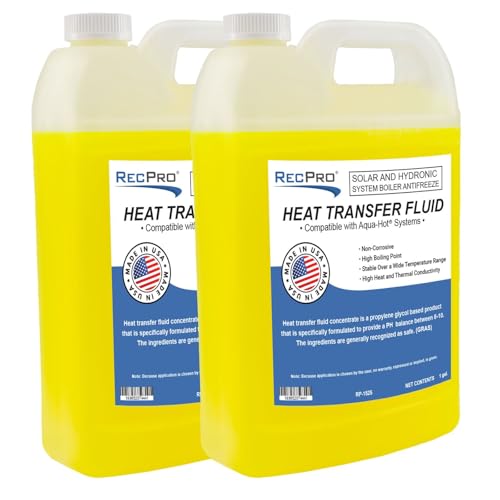Hydronic coolant heaters transfer engine or boiler heat to vehicle cabins, garages, and buildings using liquid coolant. This article reviews five relevant Amazon products spanning hanging unit heaters, under-dash and floor/wall hydronic heaters, heat exchangers, and antifreeze formulated for hydronic systems. Use the summary table below to compare core specs at a glance.
| Product | Type | Key Feature | Brand |
|---|---|---|---|
| ALECOIL HHA100 | Hanging Hot Water Unit Heater | Temperature Control Switch, centrifugal blower | Hamaom |
| Maradyne Havasu | Automotive Under-Dash Hydronic Heater | 12V, 2-Speed, 20,000 BTU/hr | Maradyne |
| Maradyne Phoenix | Floor/Wall Hydronic Heater | 25,000 BTU/hr, 250 CFM | Maradyne |
| BestEquip Brazed Plate Exchanger | Plate Heat Exchanger | 316L Stainless, 60 Plates for compact high-efficiency transfer | BestEquip |
| RecPro RV Boiler Antifreeze | Hydronic Heat Transfer Fluid | Propylene Glycol, Non-Corrosive | RecPro |
Content Navigation
- ALECOIL 100,000 BTU Hydronic Hot Water Hanging Unit Heater
- Maradyne Havasu Hydronic Automotive Heater 12V Under Dash
- Maradyne Phoenix Hydronic Heater 12V Floor/Wall Mount
- BestEquip 60 Plate Brazed Plate Heat Exchanger 316L
- RecPro RV Boiler Antifreeze For Aqua Hot Hydronic Systems
- Buying Guide For Hydronic Coolant Heaters
- Heat Source And Integration
- Capacity And Airflow
- Heat Exchangers And Isolation
- Controls And Temperature Management
- Fluid Selection And Corrosion Protection
- Physical Mounting And Installation
- Pumps And Flow Requirements
- Durability And Material Compatibility
- Noise And Air Distribution
- Maintenance And Serviceability
- Safety And Compliance
- Comparison Perspectives
ALECOIL 100,000 BTU Hydronic Hot Water Hanging Unit Heater

The ALECOIL HHA100 is a hanging hot water unit heater designed to use a building’s hot water source, such as outdoor wood boilers, to provide space heating. The unit emphasizes efficient heat transfer and quiet operation with a centrifugal blower.
- Temperature Control Switch: Automatic fan start/stop based on water inlet temperature to maintain setpoint and reduce energy waste.
- Quiet Centrifugal Blower: Low-noise operation suited for garages and workshops where sound matters.
- Directional Airflow: Adjustable louver deflector to target heated air distribution.
Suitable applications include spaces served by an external hot water source where a water-to-air heat exchanger with thermostatic control is required. Installation considerations include secure hanging supports, plumbing connections to the hot water loop, and electrical supply for the fan and controller.
Maradyne Havasu Hydronic Automotive Heater 12V Under Dash

The Maradyne Havasu is an under-dash hydronic heater that uses engine coolant to provide cabin heat. It is designed for automotive and specialty vehicle installations requiring a compact heater with louvers for directional airflow.
Call 888-896-7031 for Free Local HVAC Quotes – Compare and Save Today!
- Hydronic Operation: Uses engine coolant as the heat source, integrating with existing vehicle cooling loops.
- Durable Construction: Heat-resistant ABS housing designed for automotive interior mounting.
- Adjustable Louvers: Front panel with three adjustable louvers for directed airflow control.
This model is suitable where space is limited and integration with engine coolant is preferred. Considerations include coolant plumbing routing, 12V electrical supply, and ensuring compatible flow and pressure from the vehicle cooling system for optimal heat transfer.
Maradyne Phoenix Hydronic Heater 12V Floor/Wall Mount

The Maradyne Phoenix provides higher capacity hydronic heating for vehicles, workshops, or specialty enclosures. It is designed for floor or wall mounting and features a robust tube-and-fin core.
- Higher Output: Rated at 25,000 BTU/hr with 250 CFM to support larger spaces or rapid warm-up.
- Multi-Speed Fan: Three-speed motor with fan control switch for airflow and noise management.
- Durable Materials: 18-gauge steel case, tube-and-fin core, and rear-mounted hose connections for installation flexibility.
Applications include trucks, vans, vocational vehicles, and small buildings using engine or auxiliary hot water sources. Verify compatibility with hose sizes, water fittings, and electrical system capacity when replacing or upgrading existing units.
BestEquip 60 Plate Brazed Plate Heat Exchanger 316L

The BestEquip brazed plate heat exchanger is a compact, high-efficiency unit for hydronic heating systems requiring a physical separation between two fluid loops. Its 316L stainless plates and brazed construction make it suitable for high-temperature, high-pressure applications.
Call 888-896-7031 for Free Local HVAC Quotes – Compare and Save Today!
- Turbulent-Flow Design: Counterflow arrangement improves heat transfer efficiency without added pumping energy.
- 316L Stainless Construction: Corrosion-resistant plates and brazed seams for long service life in hydronic loops.
- Standard BSP Fittings: Four BSP FPT ports for integration with piping and hose adaptors.
Use cases include isolating a boiler loop from an indirect domestic hot water loop, coupling solar collectors to storage tanks, or isolating engine coolant from cabin heating circuits. Check pressure ratings, required flow rates, and connection sizes to match system performance targets.
RecPro RV Boiler Antifreeze For Aqua Hot Hydronic Systems

RecPro RV Boiler Antifreeze is a propylene-glycol-based heat transfer fluid formulated for hydronic boiler systems, including RV and marine applications. The product emphasizes system compatibility and freeze/boil protection.
- Propylene Glycol Base: Non-toxic formulation preferable for potable and mobile systems where incidental contact is a concern.
- Non-Corrosive Additives: Inhibitors reduce corrosion risk to pumps, heat exchangers, and plumbing components.
- Freeze And Boil Protection: Provides extended freeze protection and increases the system’s effective boiling point.
When selecting a heat transfer fluid, verify concentration recommendations, compatibility with seals and metals in the loop, and periodic testing intervals. Properly flushed and filled systems retain inhibitor effectiveness and extend component life.
Buying Guide For Hydronic Coolant Heaters
This buying guide covers the key decisions and technical parameters that affect selection, installation, and long-term performance of hydronic coolant heaters and supporting components.
Heat Source And Integration
Identify the available heat source: engine coolant, biomass boiler, wood-fired outdoor furnace, or auxiliary diesel parking heater. Choose a unit that matches the source type and plumbing arrangement. For engine-integrated systems, ensure pump flow and pressure are adequate; for boiler-based systems, confirm temperature and return rates align with the heater’s design.
Capacity And Airflow
Match BTU output and CFM to the space. Higher BTU and CFM speed warm-up and support larger volumes, but they require greater coolant flow and electrical power for fans. Use manufacturer BTU ratings and consider insulation and enclosure volume when sizing.
Heat Exchangers And Isolation
Plate and tube heat exchangers provide fluid loop isolation and enable different antifreeze chemistries or separate potable circuits. Select material (e.g., 316L stainless) based on fluid chemistry and temperature. Verify pressure and temperature ratings for safety and longevity.
Controls And Temperature Management
Thermostatic or temperature switch controls improve comfort and efficiency by starting fans or pumps at set coolant temperatures. Look for models with built-in sensors or compatibility with external thermostats for automated operation and energy savings.
Fluid Selection And Corrosion Protection
Use the correct heat transfer fluid—propylene glycol is common for non-toxic requirements, while ethylene glycol offers higher performance but is toxic. Ensure corrosion inhibitors are present and compatible with system materials. Regular testing and concentration checks maintain freeze/boil protection and inhibit corrosion.
Physical Mounting And Installation
Consider mounting location (under-dash, floor, wall, or ceiling hang), clearances for airflow, and access for maintenance. Confirm hose and fitting sizes, and whether the unit comes with or requires additional mounting hardware, brackets, or hose adapters.
Pumps And Flow Requirements
Hydronic heaters depend on adequate coolant circulation. If the vehicle or building system lacks sufficient flow, an auxiliary water pump may be necessary. Verify pump compatibility (flow rate, head) with the heater and heat source to avoid underperformance.
Durability And Material Compatibility
Assess case and core materials: stainless or brass for corrosion resistance in heat exchangers; heavy-gauge steel or durable plastics for housings. Confirm compatibility with antifreeze, especially for seals, hoses, and pump materials.
Noise And Air Distribution
Centrifugal blowers generally run quieter than axial fans and can provide higher static pressure for ducting. Adjustable louvers and directional fins help target heated air while limiting drafts. Consider multi-speed fans for noise-versus-performance trade-offs.
Maintenance And Serviceability
Check accessibility of fan assemblies, filters (if any), hose connections, and electrical connectors. Regularly inspect hoses for degradation, verify inhibitor levels, and follow manufacturer-recommended service intervals to preserve performance.
Safety And Compliance
Ensure installations follow local codes and vehicle regulations. Pressure relief devices, correct hose rating, secure mounts, and electrical circuit protection all contribute to safe operation. For potable hot water systems, use appropriate isolation and certified components.
Tips for Getting the Best HVAC Prices
- Prioritize Quality Over Cost
The most critical factor in any HVAC project is the quality of the installation. Don’t compromise on contractor expertise just to save money. - Check for Rebates
Always research current rebates and incentives — they can significantly reduce your overall cost. - Compare Multiple Quotes
Request at least three estimates before making your choice. You can click here to get three free quotes from local professionals. These quotes include available rebates and tax credits and automatically exclude unqualified contractors. - Negotiate Smartly
Once you've chosen a contractor, use the proven strategies from our guide — How Homeowners Can Negotiate with HVAC Dealers — to get the best possible final price.
Comparison Perspectives
- Vehicle vs. Building Use: Under-dash and compact units focus on space and integration with engine coolant; hanging and floor/wall heaters are built for larger building loads and external boilers.
- Isolation Needs: If mixing fluids or protecting potable loops, select a plate exchanger to isolate circuits.
- System Simplicity vs. Control: Passive units with thermostatic switches simplify operation; systems needing precise control may benefit from external thermostats and variable-speed pumps.
